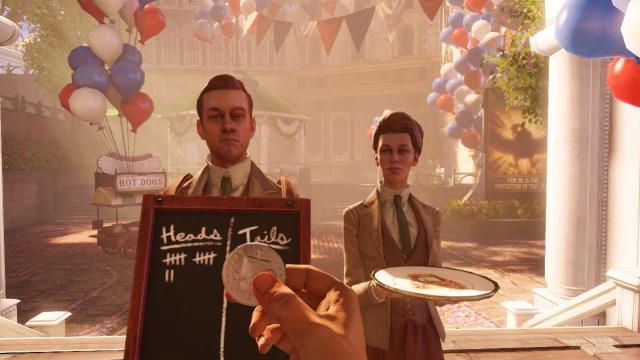USgamer Community Question: Which Bad Game's Hype Did You Fall For?
Has a crappy game's hype ever made a sucker out of you?
This article first appeared on USgamer, a partner publication of VG247. Some content, such as this article, has been migrated to VG247 for posterity after USgamer's closure - but it has not been edited or further vetted by the VG247 team.
Okay. It's time to make a confession. When it comes to hype, which bad game made a sucker out of you? Did you fall for what was written on the back of a box? Were there ads that hooked you into believing what you were buying was going to be great?
Or even worse, did an overly-enthusiastic review fool you into making you think a game was brilliant, and when you bought it, it clearly was not.
That's what we want to know as we all answer this week's question - Which bad game's hype did you fall for?
While you ponder your answer, here are the overly-hyped games that fooled Team USgamer:
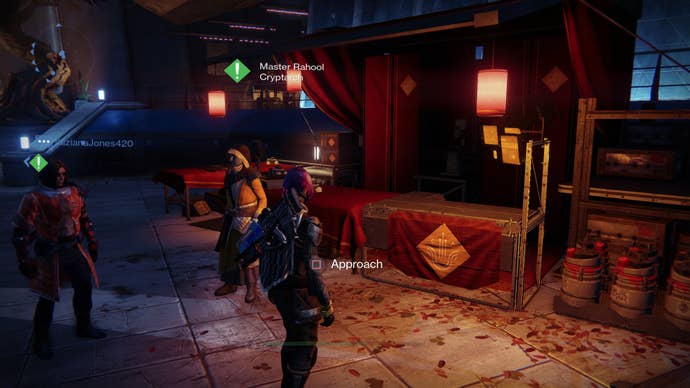
Jeremy Parish, Editor-in-Chief
OK, it's not really correct to call Destiny a bad game — but the product I played last fall was not the game I wanted, or the one I had expected based on everything that had been shown and said prior to launch. It was more like… the rough draft of the game Bungie and Activision had been talking about. I sat through Bungie's E3 2013 presentation and saw them gesture to the wastelands beyond the city walls and make promises like, "See all of that out there? In the final game, you can go there." None of that potential actually played out within the final product.
I was promised a vast, open-world, story-driven shooter; what I got was a bunch of repetitive dungeon raids in a few small locations against the same dozen enemies with no narrative substance whatsoever to link it all together. No question Destiny has basically the best FPS gunplay I've ever experienced, but there's really not much to do with that fantastic player interface. For some people just the thrill of shooting and grabbing loot with friends has proven to be plenty — I have friends and relatives who are totally hooked on grinding the same few missions for hours every day in search of randomized key or weapon drops — but I need a little more steak with my sizzle. An interesting story to hang my shooting on, and maybe a few more unique spaces and foes to conquer. Destiny has World of Warcraft ambitions in console FPS real estate space, and after 20 hours it became too cramped and repetitive for my tastes.
I'm not really mad at Bungie, though. Based on numerous rumors and supposed insider stories, it sounds like they game they created actually was the one they were enthusing about to the press, but somewhere between focus-testing and release massive swaths of their creation (including anything resembling a plot) were surgically removed, leaving Destiny a hollow effigy of its intended self at the publisher's request.
Maybe that's true, maybe not… but the upcoming Taken King expansion basically sounds like the actual substance of the game is being sold as a separate add-on product. The expansion certainly sounds like a shooter I'd want to play — but I thought that about the original version of Destiny, too. After 20 years of loving each and every one of Bungie's shooters, of playing them day-one whenever possible… I think I'll wait for the reviews this time around.
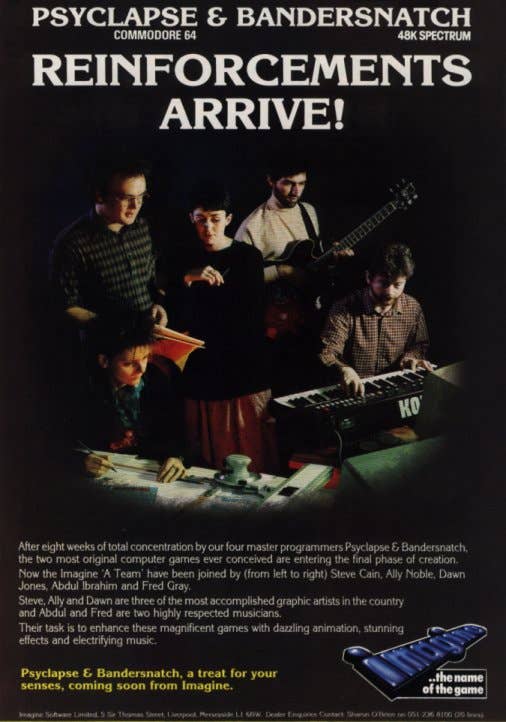
Jaz Rignall, Editor-at-Large
Two games made a sucker out of me, and neither of them ever actually existed. They're a pair of titles from way back in the mists of time - 1984 to be exact. Back then, the Commodore 64 and ZX Spectrum ruled the roost in the UK, and one of the most well-known developers of the era was Imagine software. The company had decided to create a series of "Megagames" - advanced games that were going to be shipped with additional pieces of hardware that slotted into the back of the computer to boost its capabilities, thus making these all-new games better than anything ever seen before.
Or, at least, that's the way the story was told.
I first saw the two games advertised in a magazine on a full page that was nearly all white, but with two very cool-looking logos proclaiming "Bandersnatch" and "Psyclapse" at the bottom. It was a brilliant piece of hype that captured my attention. What were these games? Why no screenshots? What's their secret? I wanted to know more.
Over the coming months, additional ads appeared, showing the very well respected team of programmers that were allegedly working on these games. "How will these four master computer game writers be feeling in a few weeks time," said the ad. "They have been brought together to pool their awesome talents to create the two most sensational, mind-boggling games ever imagined."
The ad was rounded off with "Coming soon from Imagine… Psyclapse and Bandersnatch… the two most exhilarating experiences ever. Can you wait?" No. I couldn't. My naive teenage mind was fully sucked in by the hype. I wanted to play these brilliant new games right now! Every week, I asked my local computer store manager when these games were going to be released. He always gave me the same answer, "apparently, sometime next month."
A few months later, Imagine Software imploded. Apparently, it owed tens of thousands of pounds to publishers for all the ads they'd placed in magazines - many of them for the vaporware that was Bandersnatch and Psyclapse - but, due to poor company management and the company not quite selling the amount of games they expected to, they were out of cash. Bankruptcy quickly followed, and the games were never finished - although apparently some assets and concept work wound up being acquired and used for a Psygnosis' Amiga game called Brattacas a few years later.
Not understanding what had happened, I kept on asking the computer store owner when these games were going to come out, and he patiently explained what had happened to the company and that these games weren't ever going to be released. I felt so sad and cheated. That was the first time I realized that game development could go horribly wrong, and it was certainly a good lesson in not believing hype.
I've been a little more cynical ever since....
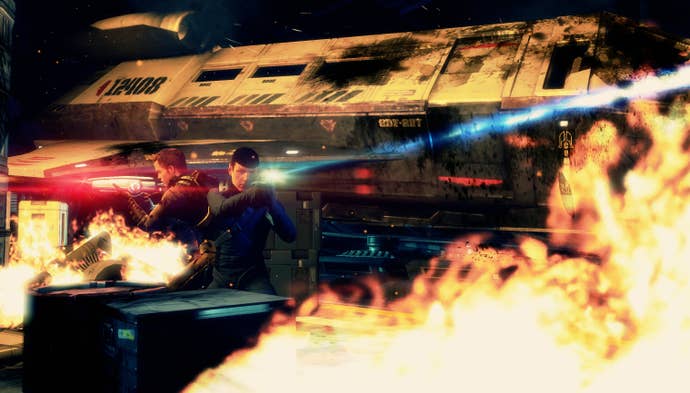
Kat Bailey, Senior Editor
It's time for me to talk about one of the more painful episodes in my career as a game journalist. I'm going to talk about the time that I wrote a cover story for GamePro about the Star Trek third-person shooter.
In 2011, I was tabbed to fly up to London, Ontario - a drab little town with a tiny airport and little else - to see what was being hyped as a Triple-A quality Star Trek project. It was an exclusive, so I was the only journalist amid an army of PR reps and consultants representing the Star Trek franchise's diverse interests. I was brought to a conference room where I was shown the prototype that had won Digital Extremes approval for the project, about 20 minutes of gameplay, and a lot of concept art. Afterward, I was invited to interview practically every lead involved with the project, including the Lead Programmer and the Lead Artist. It was an interesting if rather exhausting day.
I left feeling pretty positive about the project. The production values were reasonably high, the dynamic between Kirk and Spock was right, and it was being treated as a project worthy of a real PR blitz and not just a lousy licensed game. At its best, I figured it could be a kind of co-op puzzle shooter that mixed the best of Classic Trek and JJ Abrams Trek in a game that was actually worthy of the name. The gameplay I had seen had certainly had its moments, including a really cool swooping dive around the Enterprise as Kirk and Spock snuck aboard to take on the game's super secret enemies (the Gorn, as it turned out).
When it finally came out two years later, though, it was critically panned, receiving a 42 on Metacritic. It was buggy and generic in the extreme and loaded with repetitive mini-games. I was not on that review, which was a blessing. When I look back on that cover story now, it's with more than a little embarrassment. Digital Extremes had talked a good game, but their final product was woefully inadequate.
That's the danger of doing these previews, I guess. It was a hard lesson in not taking developer hype at face value. In the end, though, it really wasn't a terrible idea. It's a pity it was so terrible executed.
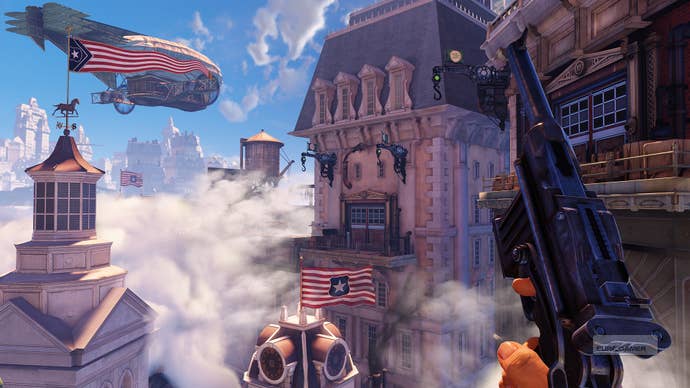
Bob Mackey, Senior Writer
I wouldn't say I completely fell for the hype, but, like a lot of you out there, I had high hopes for BioShock Infinite. And how couldn't I? In the six years it stewed in development, we were assured Infinite would undoubtedly be The Best Thing Ever. So, naturally, I assumed I could trust creator Ken Levine, who earned a hell of a lot of goodwill with the first BioShock—even if the second one proved the series didn't necessarily need him around to succeed. Though I'd wormed my way into a full-time games press gig by 2011, I somehow managed to maintain my media blackout on BioShock Infinite, and waited patiently for its long-delayed release in the Spring of 2013.
Of course, the games press is a fickle, shrinking beast, so I'd been unemployed for weeks by the time Infinite hit—meaning I still had plenty of time to sit around, play video games, and feel sorry for myself. Taking pity on me, a friend lent me the game, saying nothing more than, "We're going to need to talk about that ending."
But that wouldn't be my biggest problem with Infinite. It's a game with some bright moments, brilliant art design, and great voice acting, but the final product can't help but feel like a cobbled-together mess with an ugly, intellectually dishonest message at its core. The first 20 minutes of Infinite presented the version of Columbia I wanted to explore—not the gauntlet of endless, dumb gunfights that stretched out in front of me for the next ten hours. As I played, I honestly couldn't believe the simplicity of Infinite's design: The clever interactions with the environment (mostly used for killing enemies) were scaled waaay back, and Infinite's Big Daddy surrogates didn't offer the same prolonged, tense encounters as their predecessors. The original BioShock had plenty of gunfights, but it also had its quiet moments: Infinite seemed absolutely afraid of having you do anything other than shoot dudes in the face, so that's basically all protagonist Booker DeWitt does.
If I had access to alternate dimensions, I'd like to peek my head into one where Infinite came together as planned. I'd love to see, for instance, a BioShock Infinite where Elizabeth does more than dispense power-ups and talk over audio logs. One where the Sky-Lines act as more than a barfy diversion. Most importantly, I wish our version of BioShock Infinite didn't contain the overarching "truth is in the middle" moral that glosses over complex human actions with a shrugging "Sometimes good people do bad things?" (Only a video game could try to paint a people's uprising against a racist, fascist government as morally ambiguous.)
That said, we all know what happened. Irrational Studios crashed and burned, Levine handled the situation poorly, and the staff who weren't selected as his Chosen Ones went on to make much better games. The last generation set Ken Levine up as a visionary in its early years, but what promised to be his magnum opus ended up being Just Another Dumb Shooter. So thanks, BioShock Infinite, for making me even more cynical.
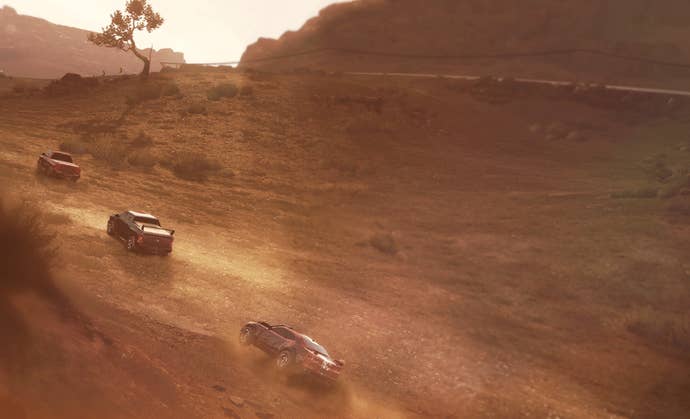
Bill Lavoy, Guides Guru
There’s never a shortage of games that fail to meet my expectations, but there aren’t too many that make a fool out of me. I like to think that I have a good eye for what is going to bring the goods, and what isn’t worth the bandwidth required to install the day one patch. Rarely do I find myself in a situation where I’m genuinely surprised at how far below expectations a game lands. The Crew, however, was a game that I was so high on, and ended up being very disappointed in. It felt a lot like getting sucker punched from behind.
It started with Ubisoft’s E3 press conference in 2014. I bought into what The Crew was selling. I was dreaming of coast-to-coast road trips even before Aisha Tyler left the stage. It never really occurred to me that Ubisoft was the best publisher out there when it came to the pre-release hype. I should have known, but I was blinded by that open world racing itch.
It’s not even that The Crew was bad. There were certainly some cool aspects to it, but I found that the negative far outweighed the positive. I really enjoyed those long road trips from coast-to-coast… at least until I realized that the damage model was horrendous. I still recall rear-ending a car, having the damage show up on my back bumper, and then disappearing a few seconds later. That one mechanic violently sucked me out of the immersion that I had craved so badly.
Then there was the weak story, the terrible AI, and the full implementation of the formula that exists in most Ubisoft games. The one where you can’t see a section of the map until you visit a key location and press a button. I’m probably going to miss some games here, but you’ve seen this same mechanic in Watch Dogs, Assassin’s Creed, and even Far Cry. I should have seen this coming a mile away, but I let myself believe that The Crew was going to be everything that it promised. As foolish as it sounds, I just didn’t expect that the blueprint was going to be another copy and paste job.
The thing is, I’m not even mad at Ubisoft. It’s their job to sell me on games, and they did that. I’m the one who didn’t do his job as a consumer. I believed the hype when the evidence said that I should remain skeptical. It was a tough lesson to learn, but hopefully it’s one that will save me some disappointment this fall.
